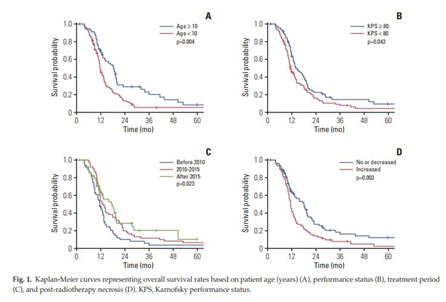글로벌 연구동향
방사선종양학
- 2023년 03월호
[Cancer Res Treat .] Suggestions for Escaping the Dark Ages for Pediatric Diffuse Intrinsic Pontine Glioma Treated with Radiotherapy: Analysis of Prognostic Factors from the National Multicenter Study
연세의대, 차의대/ / 김현주, 윤홍인*, 서창옥*
- 출처
- Cancer Res Treat .
- 등재일
- 2023 Jan
- 저널이슈번호
- 55(1):41-49.
- 내용
Abstract
Purpose: This multicenter retrospective study aimed to investigate clinical, radiologic, and treatment-related factors affecting survival in patients with newly diagnosed diffuse intrinsic pontine glioma (DIPG) treated with radiotherapy.Materials and methods: Patients aged <30 years who underwent radiotherapy as an initial treatment for DIPG between 2000 and 2018 were included; patients who did not undergo magnetic resonance imaging at diagnosis and those with pathologically diagnosed grade I glioma were excluded. We examined medical records of 162 patients collected from 10 participating centers in Korea. The patients' clinical, radiological, molecular, and histopathologic characteristics, and treatment responses were evaluated to identify the prognosticators for DIPG and estimate survival outcomes.
Results: The median follow-up period was 10.8 months (interquartile range, 7.5 to 18.1). The 1- and 2-year overall survival (OS) rates were 53.5% and 19.0%, respectively, with a median OS of 13.1 months. Long-term survival rate (≥ 2 years) was 16.7%, and median OS was 43.6 months. Age (< 10 years), poor performance status, treatment before 2010, and post-radiotherapy necrosis were independently associated with poor OS in multivariate analysis. In patients with increased post-radiotherapy necrosis, the median OS estimates were 13.3 months and 11.4 months with and without bevacizumab, respectively (p=0.138).
Conclusion: Therapeutic strategy for DIPG has remained unchanged over time, and the associated prognosis remains poor. Our findings suggest that appropriate efforts are needed to reduce the occurrence of post-radiotherapy necrosis. Further well-designed clinical trials are recommended to improve the poor prognosis observed in DIPG patients.

Affiliations
Hyun Ju Kim 1, Joo Ho Lee 2, Youngkyong Kim 3, Do Hoon Lim 4, Shin-Hyung Park 5, Seung Do Ahn 6, In Ah Kim 7, Jung Ho Im 8, Jae Wook Chung 9, Joo-Young Kim 10, Il Han Kim 2, Hong In Yoon 11, Chang-Ok Suh 8
1Department of Radiation Oncology, Gachon University Gil Hospital, Incheon, Korea.
2Department of Radiation Oncology, Seoul National University Hospital, Seoul National University, College of Medicine, Seoul, Korea.
3Department of Radiation Oncology, Kyung Hee University Medical Center, Kyung Hee University School of Medicine, Seoul, Korea.
4Department of Radiation Oncology, Samsung Medical Center, Sungkyunkwan University School of Medicine, Seoul, Korea.
5Department of Radiation Oncology, School of Medicine, Kyungpook National University, Daegu, Korea.
6Department of Radiation Oncology, Asan Medical Center, University of Ulsan College of Medicine, Seoul, Korea.
7Department of Radiation Oncology, Seoul National University Bundang Hospital, Seongnam, Korea.
8Department of Radiation Oncology, CHA Bundang Medical Center, CHA University School of Medicine, Seongnam, Korea.
9Department of Radiation Oncology, Chonnam National University Medical School, Gwangju, Korea.
10Proton Therapy Center, National Cancer Center, Goyang, Korea.
11Department of Radiation Oncology, Yonsei Cancer Center, Yonsei University College of Medicine, Seoul, Korea.
- 키워드
- Diffuse intrinsic pontine glioma; Prognosis; Radiotherapy.
- 덧글달기







